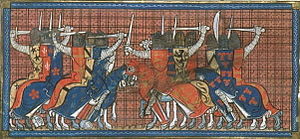| Battle of Taillebourg | |||||||
|---|---|---|---|---|---|---|---|
| Part of the Saintonge War | |||||||
 Battle between the French (Louis IX) and the English (Henry III). (British Library, Royal 16 G VI f. 399) | |||||||
| |||||||
| Belligerents | |||||||
| Kingdom of France | Kingdom of England and French allies | ||||||
| Commanders and leaders | |||||||
|
Louis IX of France Alphonse of Poitiers |
Henry III of England Richard of Cornwall Hugh X of Lusignan | ||||||
| Strength | |||||||
|
4,000 knights 20,000 infantry |
1,600 knights 700 crossbowmen 20,000 infantry | ||||||
| Casualties and losses | |||||||
| Light | Heavy losses | ||||||
The Battle of Taillebourg, a major medieval battle fought in July 1242, was the decisive engagement of the Saintonge War. It pitted a French Capetian army under the command of King Louis IX, also known as Saint Louis, and his younger brother Alphonse of Poitiers, against forces led by King Henry III of England, his brother Richard of Cornwall and their stepfather Hugh X of Lusignan.
The battle was fought on the bridge built over the river Charente, a point of strategic importance on the route between northern and southern France. Later it was fought near the city of Saintes. According to Charles Oman; the English and their allies were routed and forced to make peace[citation needed] but the King of France contented himself of leaving things as they had been before the war.[1] The battle put down the Poitevin revolt and marked the end of Henry III's hopes of restoring the Angevin Empire, which had collapsed during his father's reign.
- ^ Oman, Charles (19 January 2018). A History of England. Ozymandias Press. p. 419. ISBN 978-1-5312-6647-9.